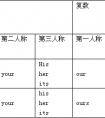We study five days_____week and on Sundays we often play_____football. [ ]A. a; ntheB. 不填; a C. an; aD. a; 不填 -九年级英语
题文
| We study five days _____ week and on Sundays we often play _____ football. |
|
[ ] |
| A. a; nthe B. 不填; a C. an; a D. a; 不填 |
答案
| D |
据专家权威分析,试题“We study five days_____week and on Sundays we often play____..”主要考查你对 不定冠词(a,an),零冠词 等考点的理解。关于这些考点的“档案”如下:
不定冠词(a,an)零冠词
考点名称:不定冠词(a,an)
- 不定冠词:
定冠词,英语虚词冠词的一种,冠词是虚词,本身不能单独使用,也没有词义,它用在名词的前面,帮助指明名词的含义。
英语中的冠词有三种,一种是定冠词,另一种是不定冠词,还有一种是零冠词。
不定冠词a(an)与数词one同源,是"一个"的意思。a用于辅音音素前,一般读作e,而an则用于元音音素前,一般读做en。 - 不定冠词基本用法:
不定冠词主要用在可数名词单数前,表示:
1.“一个”
She is a friend of mine.她是我的一位朋友。
可用在表示数量的词组中:four times a day, half a kilo
2. “某一个”
A car is waiting at the gate.有一辆车在门口等你。
3. 某类人或物(可用在表语、同位语中):
She is a Canadian (dancer.)她是加拿大人(舞蹈演员)。
4. 某类人或物(可作主语,表示整个这类人或东西):
A child needs love.孩子需要爱。 定冠词和不定冠词的区别:
一、不定冠词表示泛指,定冠词表示特指。
不定冠词a (an)与数词one 同源,是"一个"的意思。a用于辅音音素前,一般读作[e],而an则用于元音音素前,一般读做[en]。
1、表示"一个",意为one;指某人或某物,意为a certain。如:
A Mr. Ling is waiting for you.
2、 代表一类人或物 如:
A knife is a tool for cutting with.
Mr. Smith is an engineer.
二、定冠词the与指示代词this,that同源,有"那(这)个"的意思,但较弱,可以和一个名词连用,来表示某个或某些特定的人或东西。
定冠词的用法:
1、特指双方都明白的人或物:
Take the medicine. 把药吃了。
2、上文提到过的人或事:
He bought a house. I've been to the house. 他买了幢房子。我去过那幢房子。
3、指世上独一物二的事物:
the sun, the sky, the moon, the earth
4、单数名词连用表示一类事物,如:the dollar 美元; the fox 狐狸;
或与形容词或分词连用,表示一类人:the rich 富人; the living 生者。
5、用在序数词和形容词最高级,及形容词only, very, same等前面:
Where do you live? I live on the second floor. 你住在哪?我住在二层。
That's the very thing I've been looking for. 那正是我要找的东西。
6、与复数名词连用,指整个群体:
They are the teachers of this school.指全体教师)
They are teachers of this school. (指部分教师)
7、表示所有,相当于物主代词,用在表示身体部位的名词前:
She caught me by the arm.. 她抓住了我的手臂。
8、用在某些由普通名词构成的国家名称、机关团体、阶级、等专有名词前:
the People's Republic of China 中华人民共和国
the United States 美国
9、用在表示乐器的名词之前: She plays the piano. 她会弹钢琴。
10、用在姓氏的复数名词之前,表示一家人:
the Greens 格林一家人 (或格林夫妇)
11、用在惯用语中:
in the day, in the morning (afternoon,evening), the day after tomorrow
the day before yesterday, the next morning,
in the sky (water,field,country)
in the dark, in the rain, in the distance,
in the middle (of), in the end,
on the whole, by the way, go to the theatre冠词口诀:
冠词分为定冠、不定冠,
不定冠词a和an,“—”的含义表泛指
表示特指要用the,次序、方位、最高级
世上物体独一个,人或事物再次提
以下情况冠词免,学科球类三顿饭
名词复数表泛指,季节星期月份前不定冠词位置:
不定冠词常位于名词或名词修饰语前。注意:
a. 位于下列形容词之后: such,what,many,half,
I have never seen such an animal.
Many a man is fit for the job.
b. 当名词前的形容词被副词as, so, too, how, however, enough修饰时,不定冠词应放在形容词之后:
It is as pleasant a day as I have ever spent.
So short a time.
Too long a distance.
c. quite,rather与单数名词连用,冠词放在其后。
但当rather,quite 前仍有形容词,不定冠词放其前后均可。如:quite a lot
d. 在as,though 引导的让步状语从句中,当标语为形容词修饰的名词时,不定冠词放形容词后:
Brave a man though he is,he trembles at the sight of snakes. 他尽管勇敢,可见到蛇还是发抖。
当名词被比较级形容词修饰时,不定冠词通常置于比较级形容词之后。
定冠词通常位于名词或名词修饰语前,但放在all, both,double,half,twice,three times等词之后,名词之前。
All the students in the class went out. 班里的所有学生都出去了。
考点名称:零冠词
- 零冠词:
是指名词前面没有不定冠词(a、an)、定冠词(the),也没有其他限定词的现象。零冠词也是冠词的一种。
例如:
This is my book.
Bread is made from flour.
Let's go and play basketball.
He is head of the factory.
注意:有些名词前用the,或不用the,其意义有所不同。例如:
go to school 上学
go to the school 到学校去
in future 今后,将来
in the future 将来 零冠词的用法:
1.表示抽象概括意义时,不可数名词和复数名词使用零冠词,例如:
(/)Books are my best friends.书是我的好朋友。
(/)Cotton feels soft.棉花摸起来柔软。
(/)Water boils at 100℃.水在摄氏100度沸腾。
比较:The water in this river is undrinkable.这条河的水不可饮用。
2.专有名词通常使用零冠词,例如:
(/)Lu Xun is a great Chinese writer.鲁迅是一位伟大的中国作家。
(/)London is the capital of England.伦敦是英国的首都。
(/)China is a developing socialist country.中国是一个发展中的社会主义国家。
(注意:组合国名或缩写国名前加定冠词,如:the United States 美国;the U.K 英国)
3.按照习惯下列各类名词使用零冠词:
1)季节、月份、星期以及节假日(中国传统节日除外,详细请查阅“定冠词”)等名词前,例:
(/)Summer begins in June in this part of the country.这个地区夏天从六月份开始。
We have no classes on(/) Sunday.星期日我们不上课。
There are a lot of (/)people shopping at (/)Christmas.在圣诞节有很多人购买东西。
2)三餐饭菜的名词,例:
have (/)supper 吃晚饭
come to (/)dinner 去吃饭
3)语言、运动、游戏等名词,例:
She speaks (/)Chinese.她说汉语。
He plays (/)football.他踢足球。
Let’s have a game of (/)chess.咱俩下盘棋吧。
4)在某些意义有改变的名词前要使用零冠词,例:
- 最新内容
- 相关内容
- 网友推荐
- 图文推荐
| [家长教育] 孩子为什么会和父母感情疏离? (2019-07-14) |
| [教师分享] 给远方姐姐的一封信 (2018-11-07) |
| [教师分享] 伸缩门 (2018-11-07) |
| [教师分享] 回家乡 (2018-11-07) |
| [教师分享] 是风味也是人间 (2018-11-07) |
| [教师分享] 一句格言的启示 (2018-11-07) |
| [教师分享] 无规矩不成方圆 (2018-11-07) |
| [教师分享] 第十届全国教育名家论坛有感(二) (2018-11-07) |
| [教师分享] 贪玩的小狗 (2018-11-07) |
| [教师分享] 未命名文章 (2018-11-07) |

![— Do you know Meimei? — Yes, she is from a university and she is _____ honest girl. [ ]A. a B. an C. / -九年级英语](http://www.00-edu.com/d/file/ks/4/2/budingguanciaan/2019-11-29/small4247048cc84563d0252c1b027b2033211574983264.png)
![—Did that sportsman win ____ gold medal at ____Athens Olympics?—Yes, he did.[ ]A. a; an B. a; theC. a; / D. /; the-九年级英语](http://www.00-edu.com/d/file/ks/4/2/budingguanciaan/2019-11-29/small06f379c6a3c3ac9bb311d3a899491d161574984708.png)
![We don’t think she is ____ honest girl. [ ]A. a B. an C. the D. /-八年级英语](http://www.00-edu.com/d/file/ks/4/2/budingguanciaan/2019-11-29/small71b0b51d70c69d2813b4c24ce33ea1331574983883.png)
![— Do you have _____ MP3? — NO, I don't.[ ]A. a B. an C. the -九年级英语](http://www.00-edu.com/d/file/ks/4/2/budingguanciaan/2019-11-29/smallb4936ea5ddac8c680b9d3e87837821eb1574983324.jpg)

